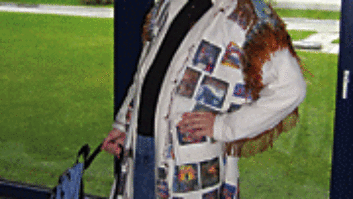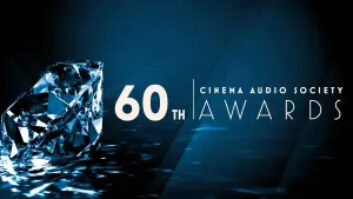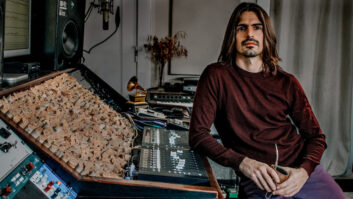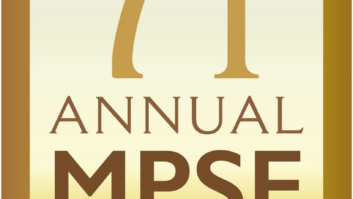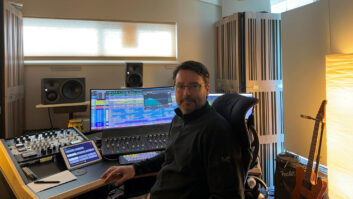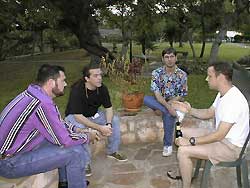
Dennis Staats (Dolby Labs), Joe Bryan (Universal Audio), Brian Schmidt (Microsoft) and Alexander Brandon (Midway) continue a workgroup discussion on the porch.
Photo: Mike D’Amore
Anyone seeking out the future of game audio would do well to start with Project Bar-B-Q (www.projectbarbq.com), an annual think tank-style meeting where some of the biggest brains in computers and audio gather at a remote Texas ranch to fire up the grill, hang by the lake and tackle the top technological challenges facing the game sound industry. Over the past twelve years, discussions at the Bar-B-Q (whose annual goal is simply “Influencing Music Hardware & Software Over The Next Five Years”) have evolved into standards in 3D audio, game music, Web radio, mobile apps; the interactive IXMF file format standard was conceived at the event, and G.A.N.G. (Game Audio Network Guild) was born there. On the eve of the Game Developers Conference in San Francisco, we asked Bar-B-Q founder and host George Sanger—better known as the Fat Man—to tell us a little about the group.
Take us back to the beginning…what’s the story behind the Bar-B-Q?
To set the stage, this was back over a decade ago. I had been doing a lot of work cleaning up the General MIDI spec, because I felt responsible for having brought people (listeners, composers, manufacturers) to to that standard as a result of my having written the first GM game score, for The 7th Guest—T7G sold well over 1.5 million in its first run, and pretty much introduced the concept of CD-ROM gaming as a profitable business.
So all my GM music was out there, and supposedly it would play back on any GM sound card. But it had only ever been played on one card (the Roland Sound Canvas) because that’s the only hardware that played GM when the game was released. After the game’s release, a bunch of GM sound cards came out, and I listened, and they all sounded like crap. So I created Fat Labs to test GM cards to make sure they would sound OK with tunes composed on other GM cards. We weren’t making money, but we did a pretty good job of cleaning up the mess.

There’s always time for another jam session.
In my efforts to do so, it was becoming clear that my best intentions and best skills did not fit well within the industry structures that already existed. I tried to be a good contributor to the MMA (the true custodian of the MIDI spec) and the IA-SIG (the interactive audio trade organization within the MMA that I had helped jump start), but my best efforts to work with people seemed to meet with a lot of friction.
One evening at NAMM, after the annual MMA meeting, I received a thorough chewing out from the IA-SIG president Mark Miller. This was because an article I had written for Music and Computers magazine said that the trade organizations worked slowly. I apologized profusely. Then Tom White, the MMA’s president, came along and said, “Is this about the article George wrote that says we’re slow? We are!” So the MMA and I had suffered a lot for no reason, as a result of my having said something that was clear to me, that was meant to be helpful, and that turned out to be a view shared by others within the organization.
That evening, my friend and business associate Teresa Avallone and I came up with the vision, the concept, of Project BBQ: An industry-wide think-tank in Texas—outdoors, with good food and a good atmosphere and clean, clear goals—as a way that we could bring something to the community without having to dumb down everybody’s passion to the point where it was acceptable by polite society.
What is is about this unique format that’s worked so well all these years?
Tangibly, the best things about the format are probably: The group itself decides what the (approximately four) biggest problems facing the industry are. To do this in such a group of admirable, smart people gives the individuals a tremendous sense of momentum, and ownership of the issue. Linda [Law, vice president] and the facilitators have developed a style that guides the groups to specific accomplishments (a report, a presentation, and action items with responsible parties) in a very efficient way. Yet the facilitators and the BBQ Brothers are smart and responsive enough to know when to bend and break the “established method” for best results.
On the less tangible side, the format works because Teresa and Linda set up an atmosphere that feels safe. The first-day speakers and I step into that environment and try to set a tone in which we target our highest level of idealism. And by “idealism,” I only mean “do what’s right.” Everybody wants to do what’s right. So they think about that, they center in on what’s really important to them, they get their positive attitude on, and they go for it.
Project Bar-B-Q has made so many inroads into game sound improvement: audio fidelity test requirements for the PC from both Dolby and Microsoft. The Intel High Definition Audio spec (Azalia). The Computer Audio Experts Group (CAEG). Significant work on MIDI 2.0. What are your favorite accomplishments?
Honestly, for me the main thing is the “moments” of BBQ. I can’t possibly imagine a better time being had by anybody, anywhere on the planet, in any time period. We are there with smart friends whom we admire and who admire us. We dig into our souls and our hearts and our old stories and our tribal memories, and we dredge up the very, very best sides of ourselves. And in that mental state, we effectively and efficiently accomplish difficult goals in a very comfortable, fun, supportive, safe, and beautiful atmosphere. But here’s the official “some of our achievements” list. To see the real meat of BBQ, please send your readers to the reports page, www.projectbarbq.com/bbqtopic.htm.
Okay, so you’re a thin guy. Why does everyone call you the Fat Man?
They call me what????? Who does???
